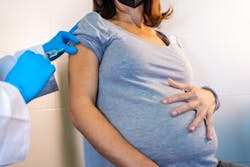Researchers continue studying COVID-19 vaccinations, pregnancy, and postpartum
With the SARS-CoV-2 pandemic ongoing, researchers at University of California San Diego School of Medicine, in collaboration with the American Academy of Allergy Asthma and Immunology (AAAAI), will continue a national study to evaluate the safety of COVID-19 vaccinations during pregnancy, and monitor immune response for mother and baby following vaccinations, according to a news release.
Published research has found that pregnant people are particularly vulnerable to SARS-CoV-2 infection and at higher risk of developing a more serious or complicated disease course, including approximately a 70 percent increased risk of death. Infection in pregnancy also increases the risk for preterm delivery and other adverse pregnancy outcomes, including stillbirth.
“Pregnant people are considered a priority population for COVID-19 vaccination. However, only about a third of pregnant persons have chosen vaccination,” said Christina Chambers, PhD, MPH, principal investigator on the Vaccines and Medications in Pregnancy Surveillance System (VAMPSS) coordinated by AAAAI, Professor in the Department of Pediatrics at UC San Diego School of Medicine and Director of the Organization of Teratology Information Specialists (OTIS) MotherToBaby Pregnancy Studies.
“As pregnant persons were not included in the original clinical trials for COVID-19 vaccinations, there is a critical need to do this work to help provide concrete information about the safety and benefits of these vaccines for both mother and baby.”
The continuation of study efforts is made possible by a $10 million, four-year grant and involves evaluating the safety of COVID-19 vaccinations among 1,800 participants.
Using the established U.S. MotherToBaby pregnancy cohort study at UC San Diego, researchers will follow-up with 900 individuals who received one or more doses of any COVID-19 vaccination during pregnancy and 900 who did not. They will evaluate pregnancy outcomes, including major birth defects, miscarriage, stillbirth, preterm delivery, and postpartum growth of infants through one year of age.
In a subset of 180 women in the study, researchers will also collect blood samples after vaccination in different trimesters of pregnancy to measure the cellular immune response to SARS-CoV-2.
The investigators will study the expansion of T lymphocytes that recognize spike and non-spike regions of the virus. The development of T cell memory, critical to determine long-lasting protection from infection, will be also defined together with the measurement of anti-SARS-CoV-2 antibodies in both mother and baby after delivery.
“The results of this sub-study will provide essential efficacy information that can support COVID-19 vaccine-related public health recommendations in this special population,” said Alessandra Franco, MD, PhD, co-investigator on the study, Immunologist and Associate Professor in Department of Pediatrics at UC San Diego School of Medicine.
“We feel confident that this study will provide important information in support of best clinical practice for obstetric providers and their patients,” said Michael Schatz, MD, lead AAAAI study coordinator.
The study will continue enrolling pregnant persons through 2024, with final results expected in 2026.

